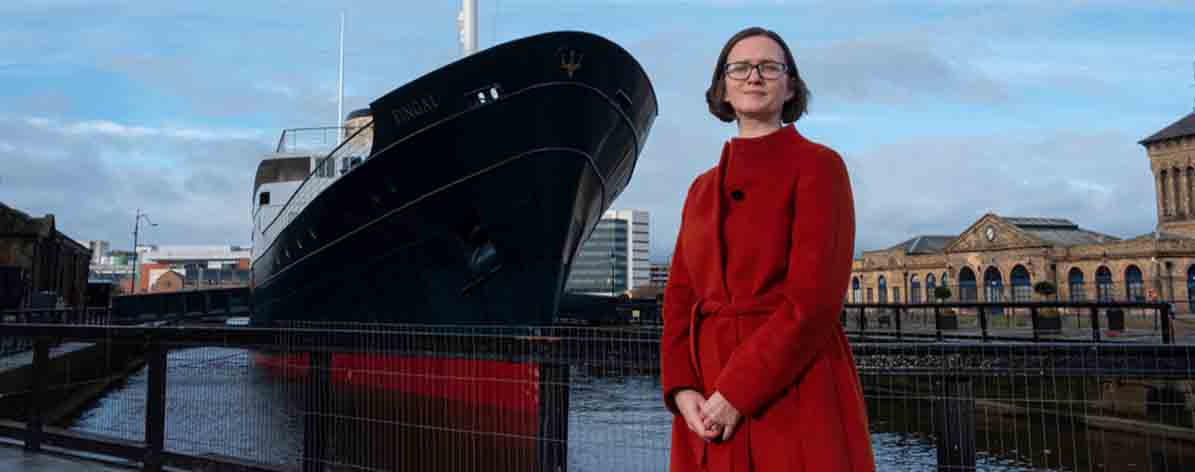Forth Ports safe haven in choppy Brexit seas

This article was first published in CA magazine. You can read the original version here.
Before 2016, it was rare to hear anyone talking about ‘frictionless trade’ or ‘border checks’ over a drink.
The fact that 95% of our imports and exports flow through our ports seemed of little consequence.
But the EU referendum result has meant people who hitherto had little interest in trade deals, now have a view on anything from WTO rules to tariffs.
“Since Brexit, there is greater appreciation, especially from government, about the importance of ports. Shipping is the mode of transport that keeps us fed and keeps the lights on,” says Forth Ports CEO Charles Hammond.
“Supply chain resilience is critical. Those trade deals will be given effect by the ports. The efficiency with which these goods are handled and distributed will be crucial to our economy.”
But it’s not just about volume. The range of business activity happening around ports reflects how our economy is developing and diversifying. Forth Ports owns and manages eight locations – seven in Scotland and one in Essex. It was founded in 1967, after the “landmark” 1962 Rochdale Report, which stated that the old system of individual ports competing against each other was unsustainable.
Or, as Hammond puts it, “There were no economies of scale.”
Fast forward to the present, and Forth Ports is thriving.
In October 2019, it reported a 5.1% rise in turnover to £225.8m, with growth across its operations. Pre-tax profi t was £73.3m for 2018.
Its customers range from Hollywood studios to offshore wind operators to Fingal (a f ve-star floating hotel berthed by Forth Ports HQ in Leith) and the organisation has recently begun its biggest investment programme to date.
Hammond adds, “One thing that marks us out is agile thinking, but that puts pressure on our team to produce the analysis that allows us to make those decisions quickly.” The decision to plough £200m into the new 150-acre port at Tilbury was taken in just six weeks and was reliant on the work of Group Financial Controller, Risk and Insurance Manager, Alex Smith CA, who joined Forth Ports seven years ago, and her team.
“The core part of my role is looking after the head office fnance team,” she says.
“We’re investing a huge amount in our infrastructure and assets to support our customer base. I need to evaluate those investments, raising funds when we need them and sensibly deploying them to grow a sustainable business.”
Smith decided to become a CA while studying international business and languages at Heriot Watt University.
“I had friends who were studying accountancy and finance,” she says.
“Those in the years above me applied to become a CA and it seemed like an excellent qualification to get. I had an understanding of the value that the CA ‘brand’ provides, so it seemed like the logical next step.”
She trained to become a CA soon after joining PwC in 1996.
“It’s an intensive three years because you’re working, studying and networking. I trained in Aberdeen, which gave me a great experience across a range of industries including oil, gas, and education through to carrot farmers and drug support charities.”
She spent 16 years at PwC “in a huge variety of roles and industries including pharmaceuticals, ports, industry, renewable energy and financial services.
“One was Forth Ports. I knew the people, the commercial aspects. I knew the culture was right. It had longevity, some people started here from school and have stayed here until they retire.
“That, to me, was a good sign. Also because the ports industry is so pivotal to the UK, it’s a great insight into what’s going on in the economy.
“Forth Ports’ landscape has changed significantly. You only have to look around Leith which used to be nothing but a port.
“Now you’ve got the Scottish government here, Michelin-starred restaurants, shopping centres and new homes.”
On location
Leith’s transition from working men’s clubs to craft beer taprooms was a theme in the era-defining book (and film) Trainspotting and Forth Ports was among the locations for its sequel T2.
“We get a lot of approaches for filming. We’ve also had Avengers Infinity War, Taboo, MasterChef…” The port is home to a huge production facility.
“Screen Scotland was looking to create a film and TV cluster in the east Scotland, and we’ve got this big shed which creates the opportunity for studio space,” she says.
“It was a redeployment of a facility previously used for wave energy prototype testing.”
Screen Scotland Executive Director Isabel Davis says, “Its scale, accessibility, proximity to crew and central Edinburgh and ability to be rapidly adapted make it a highly attractive proposition – one that could swiftly provide a home in Scotland for large-scale productions.”
Smith adds, “We’ve got a property team in Scotland and Tilbury who look at the physical space available, whether that’s office, storage, outside or quayside.”
There are other opportunities on the horizon. The government is creating 10, yet unnamed, free ports that will allow companies to import goods and reexport them outside of tax and customs rules.
Leith is bidding to secure one of the sites, although Hammond has sounded a note of caution about whether the benefits are being overstated without investment in the surrounding infrastructure.
Our trade deal with the EU is still to take shape, and seasoned Brussels watchers believe negotiations will go to the wire. But Forth Ports has spent three years preparing itself, and its customers, for all eventualities.
Smith says, “We’re fortunate because we deal with customers who trade with the rest of the world. While Brexit has driven a lot of uncertainty, we’ve been able to help customers who have only had EU trade on the processes they need to put in place as well as on working with government agencies.”
Border checks of some form are expected. But time is money. “We expect a modal shift from accompanied to unaccompanied freight because there have been horror stories about potential delays at Dover,” says Smith.
“Every hour will rack up costs you will struggle to recover from your end customer and prices going up.”
Unaccompanied freight means not having to pay a driver to board the ferry taking goods to their destination. Forth Ports has secured long-term commitments from P&O and Tarmac.
Hammond says, “P&O runs unaccompanied freight between Zeebruge and Tilbury and has committed for 15 years. Tarmac has committed for over 25 years and this will be the largest construction material processing site in the UK.
“We raised new funding (for Tilbury) in the summer through the US private placement market. They were prepared to lend for 18 years despite the Brexit uncertainty.
“Businesses like ours are long-term in nature and can ride out short-term uncertainties.”
Another significant long-term project can be found off the Port of Dundee, where work has started on an offshore wind farm. Smith, who recently took on a nonexec role at Offshore Renewable Energy Catapult, says the UK currently represents 30% of the global offshore wind capacity.
UK Trade Commissioner to Europe, Andrew Mitchell, has said it will become a key export.
Hammond adds, “Ports are the UK’s fourth-most productive industry and they continue to invest and boost productivity. When the government talks about improving productivity, the ports are a good example of an industrial strategy in action.”
Time will tell whether they also prove to be an effective Brexit strategy in action.












